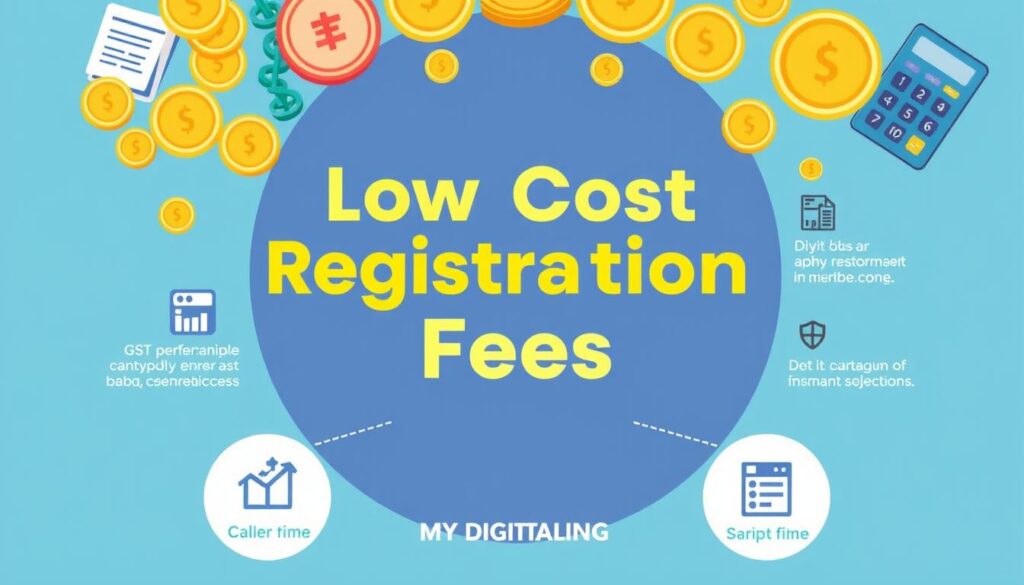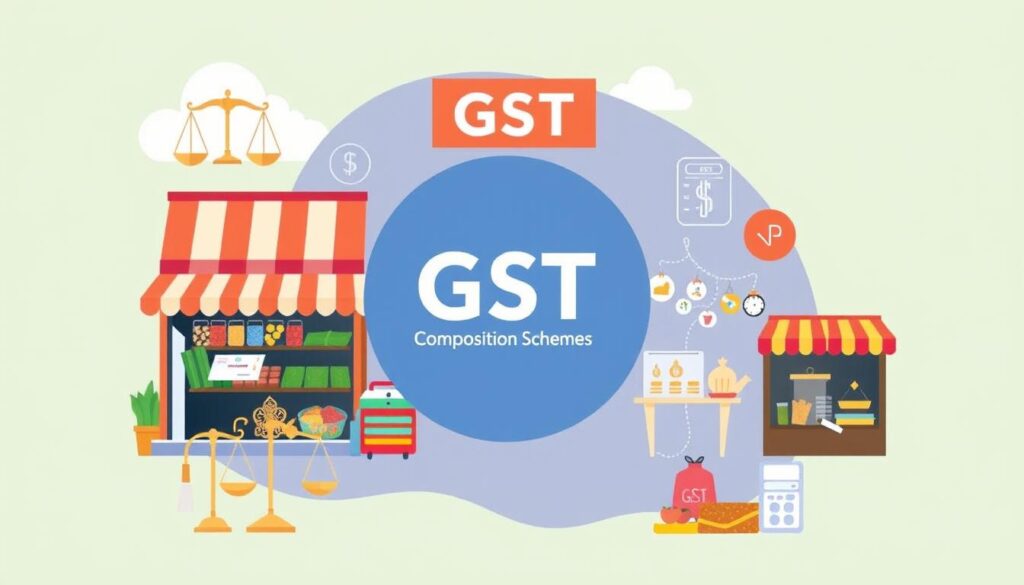Starting your own business is a dream come true. But, navigating the formalities can be tough. One key term you’ll hear a lot is New GST registration Fees. It’s not just about following rules; it’s about growing your business wisely.
The GST fees have changed, starting in 2024. This was decided at the 54th GST Council meeting. Now, there’s no direct charge for GST registration. This makes it easier for businesses to join the GST system without spending a lot of money.
Before, the fees for registering as an individual were between INR 1000 to INR 3000. Partnerships and sole proprietorships paid more, from INR 2000 to INR 5000. Companies faced fees ranging from INR 3000 to INR 6000. This shows that the fees depend on how big your business is.
But fees are just one part of it. The GST registration process takes 2-6 working days. It shows you’re serious about running a legitimate business. It also opens up chances for loans, like those from Bajaj Finserv Business Loan.
It’s important to understand the GST policy updates and how they affect your business. This article will give you a detailed look at the new GST fees. It aims to help small businesses manage their finances better. Keep reading to learn more about GST registration 2024.
Introduction to GST and Its Importance for Small Businesses
The Goods and Services Tax (GST) was introduced in India on July 1, 2017. It changed the country’s tax system in a big way. Now, there’s just one tax instead of 17, making things simpler for small businesses.

For small business owners, understanding GST is key. If your annual sales are under Rs. 20 lakh, you might not need to register for GST. But, if you go over that, you must. GST makes tax simpler, cutting down on the hassle of dealing with many taxes.
The GST registration process is now easier for small businesses. You only need a few documents, like your ID and address proof. You’ll get your GSTIN in just a week, making it easy to follow the rules. Also, if your sales are under Rs. 1.5 crore, you can use the GST composition scheme. This makes taxes even simpler and cheaper.
Here’s a summary of what you need for GST registration:
| Type of Business | Documents Required | Turnover Threshold for Mandatory Registration | Turnover Threshold for Composition Scheme |
|---|---|---|---|
| Sole Proprietor | 5 | Rs. 20 Lakh | Rs. 1.5 Crore |
| Partnership Firms and LLPs | 8 | Rs. 20 Lakh | Rs. 1.5 Crore |
| HUF | 4 | Rs. 20 Lakh | Rs. 1.5 Crore |
| Indian and Foreign Companies | 12 | Rs. 40 Lakh | Rs. 1.5 Crore |
GST is very important. It makes tax rules clear and simple for businesses. This helps create a fair business environment. Plus, GST gets rid of the problem of taxes adding up, makes starting a business easier, and simplifies filing taxes. And, while registering for GST is free, services like mydigitalfiling.in help for just Rs. 599/-, making it easier to follow the rules.
Comprehensive Overview of GST Registration Fees
The Goods and Services Tax (GST) registration is easy and free to encourage everyone to follow the rules. Businesses that make more than a certain amount must register to avoid big fines. This guide covers the main points about GST registration costs, professional help fees, and recent changes.

The Impact of Business Turnover on Registration Costs
The amount a business makes is key to GST registration fees. If a business makes more than Rs.20 lakh a year, it must register for GST. Smaller businesses are not required to register. In North Eastern States, the limit is Rs.10 lakh.
- Annual turnover over Rs.20 lakh: Mandatory registration.
- Annual turnover over Rs.10 lakh in North Eastern States: Mandatory registration.
Not registering can lead to big fines. You could face a minimum of Rs.10,000 or 10% of what you owe for not registering fully. For tax evasion, the fine can be up to 100% of the amount owed.
Navigating Professional Assistance Fees
Getting help from a GST professional can make the registration process easier. Even though registering is free, professionals might charge for things like preparing documents and giving advice. Their fees can vary a lot.
| Service | Average Fee (INR) |
|---|---|
| Basic Registration Assistance | 1,000 – 2,000 |
| Document Preparation and Filing | 3,000 – 5,000 |
| Comprehensive Consultancy | 5,000 – 10,000 |
Getting professional help can prevent delays and mistakes. It gives you peace of mind that you’re following the rules right.
Explaining the New GST Registration Fees
The GST council made changes in 2024. They didn’t add fees for registering but did increase penalties for not following the rules. Here are the main changes:
- No charges are levied for completing the GST registration process.
- In case of incomplete registration, businesses face 10% of the due amount or Rs.10,000.
- A penalty of 100% of the due tax amount is enforced in cases of tax evasion.
This new GST fees explanation shows how important it is to register on time and correctly. To make registration easy, Mydigitalfiling.in offers a great deal at Rs 599/-.
Understanding the GST Registration Process
Registering for Goods and Services Tax (GST) is key for small businesses in India. The GST registration steps make it easy to join the tax system. We’ve made a simple guide to help you through it.
- Access the official GST portal: Start by going to the official GST portal and clicking on ‘Services’.
- Generate a Temporary Reference Number (TRN): Enter your PAN, email, and mobile number to get OTPs. Remember, TRN is valid for 15 days.
- Application Form: Use TRN to fill out PART-B of the form, which asks for your business details.
- Document Uploads: Check your details against the CBDT Database and upload documents. Make sure files are PDF or JPEG and under 1 MB.
- Authentication: Finish with Aadhaar authentication or use a Digital Signature Certificate (DSC), e-Sign with OTP, or EVC.
- Review and Submission: Double-check your info before submitting. Look for the application’s color code: green for approved, red for rejected, and orange for pending.
The GST compliance procedure is now simpler. The government doesn’t charge for GST registration. But, businesses often get confused about this.
Knowing the GST registration process guide is crucial. It’s important to understand the needs of different taxpayers. For example:
- Normal Taxpayer: Register within 30 days of liability.
- Composition Scheme: Choose this if your turnover is below the limit.
- Casual Taxable Persons: Register at least five days before starting business and estimate tax.
- Input Service Distributors (ISD): Register for distributing input tax credits.
For a smooth and affordable registration, try our online GST service at just Rs. 599/-. It covers everything you need to know about how to register for GST and ensures your business meets all requirements.
The Benefits of Complying with GST Registration
Getting GST registration helps small businesses grow and improve their reputation. It offers many benefits beyond just following the law. These benefits can really help how a business runs.
Boosting Business Growth with GST Compliance
GST registration can help businesses grow in many ways. One big plus is the simpler tax system. This means businesses have fewer taxes to deal with.
This makes things more efficient and saves money. It also means less confusion, helping businesses grow with more confidence. The rules for GST registration change based on the type of business. This makes it easier for companies to join:
- Goods: ₹40 lakhs turnover threshold (₹20 lakhs in specific states)
- Services: ₹20 lakhs annual turnover limit (₹10 lakhs in certain states)
Also, businesses with turnovers between ₹20 to ₹75 lakhs can use the GST Composition Scheme. This scheme has lower tax rates. It makes paying taxes easier for small businesses, helping them stay competitive without spending too much.
Enhancing Business Reputation through GST Participation
Being part of the GST system is more than just following rules. It shows a business is transparent and accountable. This makes customers and partners trust the business more.
Before GST, some sectors like construction and textiles didn’t follow strict rules. Now, they do, making things fairer and more trustworthy. The penalties for not following GST rules can be high. This encourages businesses to keep up with GST rules, sometimes even hiring experts to help.
Advantages Across Various Sectors
The logistics sector has seen big improvements thanks to GST. It has cut costs and increased profits. GST has also made things more digital, which has made following the rules easier:
- How often you need to file GST returns depends on your turnover
- You need things like an Aadhaar card and PAN card to register
- There are steps to verify your information with GST authorities
In the end, following GST rules helps businesses grow and look better. It sets a strong base for success in a fair and open market.
| Benefits of Complying with GST | Business Impact |
|---|---|
| Streamlined Tax Structure | Reduced administrative burden, promoting growth |
| Improved Market Reputation | Enhanced trust and credibility among stakeholders |
| Lower Compliance Costs | Financial savings for reinvestment in business activities |
| Access to Incentive Schemes | Eligibility for schemes like the GST Composition Scheme |
| Legal Compliance and Avoidance of Penalties | Avoidance of significant fines and legal issues |
Detailed Breakdown of New GST Registration Fees
It’s important for small business owners in India to understand the updated GST fees. The 54th GST Council meeting changed the GST registration charges. This change depends on the business type and size. This section will help you understand the costs of GST registration and compliance for 2024.
The *online GST registration through the GST portal is free*. But, there are other costs involved, as shown below:
- Professional fees for GST registration: INR 1,000 to INR 3,000.
- Digital Signature Certificate (DSC) costs: INR 1500 to INR 3,500.
- PAN application cost for Indian citizens: INR 107.
- Professional filing charges for GST returns: INR 500 to INR 5,000 per return.
The GST registration process takes 3-7 working days after submission. *Penalties for late GST registration* can be high. It’s key to prepare your documents well to avoid delays or extra costs.
Key documents required for GST registration include:
- PAN of the business
- Proof of business registration
- Identity proofs of promoters/directors
- Bank account statements
Here’s a detailed *GST fee breakdown* based on business types:
| Business Type | GST Registration Charges |
|---|---|
| Hindu Undivided Family (HUF) | INR 1,499 |
| Proprietorship | INR 1,500 – INR 2,000 |
| Partnership Firm | INR 2,000 – INR 3,000 |
| Private Limited Company | INR 3,000 – INR 5,000 |
In Karnataka, businesses must register under GST if their turnover is over Rs. 40 lakh for goods or Rs. 20 lakh for services. GST registration costs in Karnataka with Professional Utilities are about ₹1,499. These fees change based on the business type. Hidden costs include filing charges, compliance costs, and penalties for not following rules. It’s important for businesses to plan their budget well.
For easy and affordable GST registration, consider using services like Mydigitalfiling.in. They offer hassle-free GST registration at just Rs. 599/-.
Documentation Necessary for GST Registration
Having all the right GST registration documents is key for a smooth process. Whether you’re a sole proprietor, partnership, or corporation, getting your documents in order helps a lot. This guide will help small business owners organize their paperwork.
Preparing Your Documents for Smooth GST Registration
Each business type needs specific documents for GST registration. Knowing what you need can save time and make the process easier. Here’s what you need to know:
- Sole Proprietorship Firms: Need a PAN card, Aadhar card, photo, bank details, and address proof.
- Partnership Firms: Must submit PAN cards for all partners, partnership deed, photos, and Aadhar cards for signatories.
- Hindu Undivided Families (HUF): Requires a PAN card for the HUF, PAN and Aadhar for the Karta, bank details, and address proof.
- Companies: Need a PAN card, certificate of incorporation, Memorandum of Association (MOA), PAN and Aadhar for signatories, and director’s address proof.
Also, businesses need to prepare other important documents for GST registration:
- Bank details proof, like a bank statement, canceled check, or passbook.
- Address proof, such as a property tax receipt, municipal Khata copy, or electricity bill.
The GST documentation guide also covers special needs for different business activities:
- Normal Taxpayer Registration: General needs based on business type.
- GST Practitioner: More documents for those offering taxation services.
- TDS and TCS Registration: Specific needs for those deducting or collecting tax.
- Non-Resident OIDAR Service Providers: Often need a scanned passport with Visa details.
- Non-Resident Taxable Person (NRTP) and Casual Taxable Person: Usually need a digital signature, especially for LLPs and companies.
If your annual turnover is over Rs. 40 lakh or you do inter-state supply, you must register for GST. Special category states have their own rules. Make sure to prepare your GST documents well to avoid penalties and make the process smoother.
Myths and Realities: GST Registration Costs
It’s important for businesses to know the GST myths and realities about registration costs. Many think GST registration costs money, but it’s actually free. This myth stops some small businesses from registering.
Many believe there are hidden fees for GST registration. But, the truth is simple. Here’s a table that shows myths versus GST factual information:
| Myth | Reality |
|---|---|
| GST registration is costly. | GST registration is free of charge. |
| Hidden government fees during registration. | Government does not levy any hidden fees. |
| Credit card payments attract additional GST. | Charges stem from convenience fees, not GST itself. |
| Legal complexities increase actual GST costs. | Professional assistance may incur fees, but process is straightforward. |
The actual GST costs usually come from hiring professionals. These costs depend on how complex the registration is. But, services like Mydigitalfiling.in make it affordable.
Knowing the GST factual information helps businesses feel more at ease. For example, prices on some goods have dropped after GST. In Kerala, chicken prices are expected to go down because of lower taxes.
By clearing up GST myths and realities, businesses can register without worry. With the right info and help, following GST rules is easier. It also helps the economy grow.
The Role of GST Rates in Business Pricing
The Goods and Services Tax (GST) plays a big role in how businesses price their goods and services in India. Knowing the GST rates is key to setting prices. The impact of GST rates on pricing is huge, affecting both costs and what customers pay.
GST rates are divided into different levels: 0%, 5%, 12%, 18%, and 28%. Each level covers certain goods and services. This directly affects how businesses price their items.
Let’s look at the different GST categories and what they cover:
| GST Rate | Items |
|---|---|
| 0% | Milk, Eggs, Educational Services, Health Services, Unpacked Foodgrains |
| 5% | Sugar, Packed Paneer, Tea, Edible Oils, Domestic LPG, Life-saving drugs |
| 12% | Butter, Ghee, Processed Food, Almonds, Mobiles, Umbrella |
| 18% | Hair Oil, Toothpaste, Soap, Ice-cream, Corn Flakes, Computers |
| 28% | Small cars, High-end motorcycles, Consumer durables, Luxury items |
Businesses need to watch how GST rates affect their pricing. For example, items like milk and health services have no GST, keeping them cheap. But, luxury goods like high-end motorcycles have a 28% GST, making them more expensive.
It’s important for businesses to understand GST rates and use them in their pricing. This helps keep prices competitive and ensures profit. Also, businesses must pass on tax rate cuts to customers, as GST rules require. This ensures prices reflect changes in taxes.
In summary, pricing goods and services with GST in mind helps businesses follow rules, build trust with customers, and grow. So, knowing about GST rates and their effects is crucial for businesses in India.
How to Register for GST at a Very Low Price
Registering for GST is now key for businesses in India, especially small and medium ones. Mydigitalfiling.in makes this process easier and cheaper. With our exclusive GST offer, businesses can follow GST rules without spending too much.
Our Exclusive Offer: GST Registration at Rs 599
Mydigitalfiling.in knows SMEs face budget limits. That’s why we offer GST registration for just Rs 599. This is much cheaper than usual, making GST registration affordable. Take advantage of this deal to meet GST needs without financial worry.
“Trusted by over 10 lakh satisfied customers, our goal is to make GST registration easy and affordable for all businesses.”
- Trusted By: 10 Lakh++ satisfied customers
- GST Registration Fees Offer: ₹ 599
- Threshold limit: 40 lakhs for goods, 20 lakhs for services
- Types of GST: IGST, UTGST, CGST, SGST
Simplifying Your GST Journey with Mydigitalfiling.in
Getting a GST registration can be tough due to many documents needed. But, Mydigitalfiling.in makes it easy online. We break it down into simple steps to help you avoid mistakes. Here’s how:
- Eligibility Check: We check if your business qualifies for GST registration.
- Document Preparation: We help you prepare and upload required documents like PAN, Aadhaar, and business info.
- Application Submission: We take care of the application process for you, making it hassle-free.
- Follow-up: We keep you updated on your application status until your GSTIN is ready.
Mydigitalfiling.in offers affordable GST registration through easy online services. We support India’s growing businesses in staying compliant and succeeding. Register with us today and enjoy the benefits of GST at low costs.
GST Updates and Rate Changes: What to Expect in 2024
The Goods and Services Tax (GST) is always changing to meet economic needs and rules. As 2024 comes, businesses need to know about the GST updates and rate changes. It’s key for planning and following the rules.
Key GST Rate Changes and Adjustments:
In 2024, the GST Council made some big changes:
- The threshold for reporting e-Invoices on IRP portals will be Rs.10 crore and above from April 1, 2025.
- Starting May 1, 2023, taxpayers with Rs.100 crore turnover must report tax invoices and credit-debit notes to IRP within seven days.
- From August 1, 2023, e-Invoicing is mandatory for businesses with Rs.5 crore turnover.
- Lowering GST rates on cancer drugs like Trastuzumab Deruxtecan, Osimertinib, and Durvalumab from 12% to 5%.
- Raising GST rate on car seats classified under 9401 from 18% to 28% to match motorcycle seats taxed at 28%.
- Starting Reverse Charge Mechanism (RCM) on metal scrap supply by unregistered to registered persons. Also, TDS of 2% on B2B metal scrap transactions.
Additional Regulatory Measures:
- Biometric Aadhaar for new GST registrations in Ladakh, Odisha, Kerala, Nagaland, and Telangana to improve verification.
- CBIC’s online appeals for GST, Customs, Excise, and Service Tax for easier compliance.
- The GST Section 128A waiver scheme for compliant taxpayers with specific criteria and benefits.
Knowing future GST rates is crucial for businesses to adjust. The 46th GST Council meeting shows the council’s flexibility for different sectors.
In November 2024, there were big updates:
- Notifications on TDS reporting by scrap dealers.
- The introduction of the Supplier View in the Invoice Management System (IMS).
Preparing for 2024 GST Rate Adjustments:
To handle these changes, businesses should:
- Keep up with the latest GST notifications and circulars.
- Use the new GSTN e-Services app for e-invoice verification and compliance tasks.
- Get ready for biometric authentication where needed.
Staying updated on GST 2024, including future rates, is key for Indian businesses. They need to adapt to the 2024 GST rate changes to stay competitive and follow the rules.
Conclusion
The GST registration fees for 2024 have changed a lot. These changes make it easier for small businesses in India to follow tax rules. It’s key to understand GST 2024 and stay compliant to improve your finances and reputation.
The GST registration process is important for businesses with an annual turnover over INR 20 lakhs. The rules vary based on the type of goods and services and the state. Thankfully, registering on the GST portal is free.
Our online GST registration service is available for just Rs. 599/- on mydigitalfiling.in. It makes the process easy and affordable.
Not following GST rules can lead to big fines, up to Rs 10,000 or 10% of the tax owed. So, registering on time and correctly is not just legal. It also lets businesses use Input Tax Credit, which saves money. Staying updated and using affordable services helps businesses adapt to tax changes smoothly.











